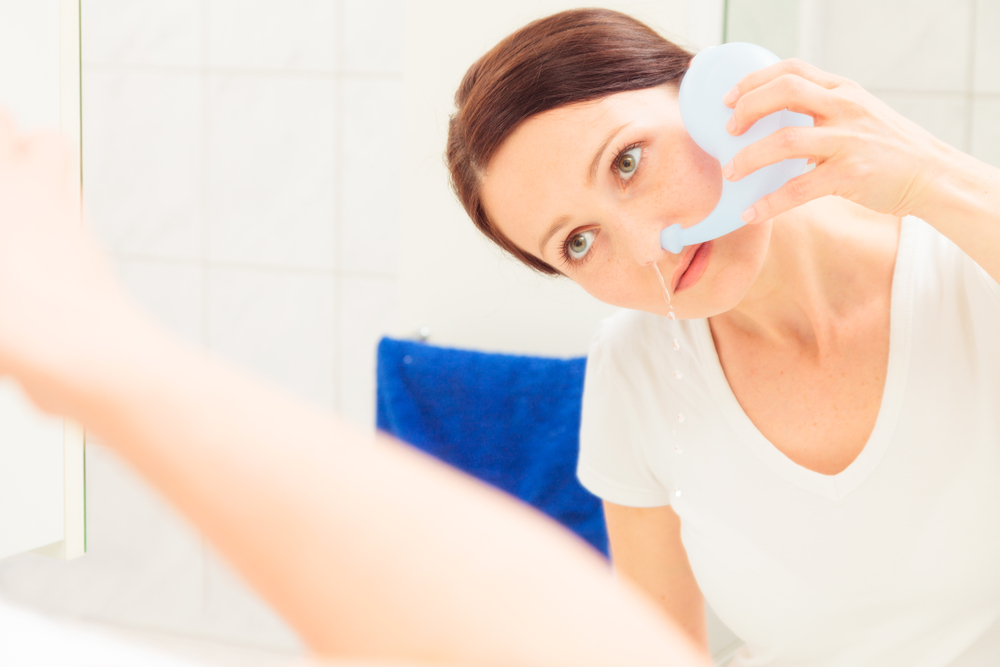With increasing pollution and chemicals in our environment, there is an enormous rise in the number of people who suffer from various forms of nasal congestion and respiratory illnesses.
Your nasal passages have a mechanism of hairs and mucous membranes that are intended to catch and restrain foreign entities from entering your body. This is one of the ways nature protects us from diseases. Unfortunately, this filtering mechanism can become overloaded through high exposure to pollution, chemicals, fragrances, pollen, and dust. Cleansing this filter regularly allows it to operate more efficiently.
The practice of sinus irrigation – known as Neti – has been used by practitioners of Ayurveda and Yoga in India for thousands of years. A simple yet powerful technique, neti works wonders for chronic sinusitis, and allergies, and has a remarkable effect on upper respiratory tract infections, especially hay fever.
Neti pots are a gentle, safe, and efficient way to deliver a good cleansing dose of saline to your sinuses.
Practice Neti on a daily basis to help keep your sinuses clean and to make your breathing free and easy.
INSTRUCTIONS FOR NETI POT USE
- Prepare a saline solution (*) with lukewarm water and fill the neti pot
- Use lukewarm water as hot water can be irritating and dangerous, and cool water is not soothing.
- (*) Fully dissolve ¼ teaspoon sea salt with 1 cup of warm water (more or less salt can be used depending on what feels best with experimentation. If the salt concentration is right it does not burn or hurt.
- If you do not find a proper solution concentration to avoid burning sensation, you may add ½ to 1-teaspoon baking soda (sodium bicarbonate) to the solution.
- Lean over your basin, or use it in your shower or bath, and tilt your head to one side
- It is helpful to initially use the neti pot in the shower for two reasons: an abundant supply of warm water, and it may be a little messy the first couple of times.
- Insert the spout of your neti pot gently into your raised nostril creating a seal between the neti pot and your nostril. DO NOT INHALE but gently pour in and across your nasal cavity and out the other nostril. Gravity will cause the water to flow correctly.
- If it drains out of your mouth, lower your forehead in relation to your chin.
- If you keep breathing through your mouth and relax, the water should gently flow through your nose on its own. There’s no forcing it.
- GENTLY blow your nose without closing off one nostril, you may have to practice a few times, but forcing a nostril closed and blowing may injure your inner ear.
- Repeat on the other nostril.
- Rinse the neti pot thoroughly.
Further suggestions if you suffer from regular sinus problems:
- There is strong evidence supporting the effectiveness of Acupuncture for allergic rhinitis (perennial & seasonal). Treatment has been shown to down-regulate total and specific IgE (1,2) and the anti-inflammatory effects of acupuncture have particular relevance to allergic rhinitis.
- Sinus problems also respond very well to Chinese Herbs. A number of formula are available to reduce the effects of Hayfever, clear Sinus infection and support your immunity if you have a history of Chronic Sinus problems.
- Avoid foods that aggravate the production of phlegm such as dairy milk, ice cream, yogurt, bananas, peanuts, fried greasy food, cold raw food, too much fruit or sugar. Once you are breathing clearly again reintroduce these foods slowly and see how your body responds. You may find you have an allergy you did realise you had.
- Vitamin C is important in the management of allergies as it is a natural antihistamine.
- Zinc is another supplement that can support your immunity and is also important for the health and maintenance of your mucous membranes, which are the main substrate for sinus infections.
- Taking a probiotic restores the balance of your inner ecosystem and with the right balance of beneficial microflora your immunity will improve and you can fight off allergens and infections.
Additional advice and herbal remedies for sinus can be obtained by seeing your local health practitioner. If you would like some acupuncture treatments to improve your sinus health then book an appointment today.
Your feedback and questions are always welcome so please leave a comment below.
For further information on Chinese Medicine contact Tania Grasseschi (Acupuncture, Chinese Herbs, Qigong and Wholefood counselling). Tania is an AHPRA registered practitioner of Chinese Medicine located in Katoomba, NSW and has spent 6 years lecturing at the Endeavour College of Natural Health Sydney campus.
The information provided on this site is for educational purposes only, and does not substitute for professional medical advice. Please consult a medical professional or healthcare provider if you are seeking medical advice, diagnoses, or treatment. Remember that you are responsible for your own health and safety at all times.
References:
(1) McDonald JL, Smith PK, Smith CA, Changli Xue C, Golianu B, Cripps AW. Effect of acupuncture on house dust
mite specific IgE, substance P, and symptoms in persistent allergic rhinitis. Ann Allergy Asthma Immunol. 2016
Jun;116(6):497-505.
(2) Li YM, Zhuang LX, Lai XS, Jiang GH. [Effects of electroacupuncture on plasma vasoactive intestinal peptide and
substance P in perennial allergic rhinitis patients]. Zhen Ci Yan Jiu. 2007 Apr;32(2):136-8.


[…] INSTRUCTIONS FOR NETI POT USE […]